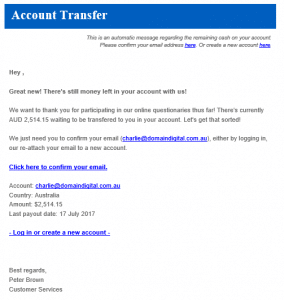I had some good friends offer to send me some money this morning. $2500 in fact. Given I had no idea who they were would normally see me delete the email.
The issue is that the allure of extra cash is often so tempting that people will click just in case thus I thought I would write about it.
What could possibly go wrong here? Lots of things is the short answer but there are two that are more likely
First, lets look at the email in question:

Its not personalised and I wasn’t expecting it. There will be one of two things they are trying to do:
- Deliver an unwanted file to my PC – this will be ransomware or a virus to cause damage to the computer
- Scam my details and or confirm I am a candidate they would like to spend some more time with
What are the warning signs of this style of scam?
- The sender claims they have identified you as a winner by randomly choosing your email address. They may say the offer is “legal” or “legitimate”, and has “government approval”
- To claim your prize you may be asked to buy a ticket, pay a fee or call a premium rate phone number (usually starting with 190).
- You may be asked to provide your bank account details, or to send the fee to a PO box number or via a money transfer service.
Be careful of phone numbers beginning with 190. These are charged at a premium rate (sometimes even for receiving a message) and can be very expensive.
How should you protect yourself?
- Be careful of phone numbers beginning with 190. These are charged at a premium rate (sometimes even for receiving a message) and can be very expensive.
- If you have any inkling the offer might be genuine, contact your computer technical support team www.domaindigital.com.au – they may be able to tell you straight away if there is an issue.
- Do an internet search using the names or exact wording of the letter/email to check for any references to a scam – many scams can be identified this way
- If you think it’s a scam, don’t respond – scammers will use a personal touch to play on your emotions to get what they want.
- Never send money or give credit card, online account details, or copies of important personal documents to anyone you don’t know or trust and never by email
Never send money or give credit card, online account details, or copies of important personal documents to anyone you donu2019t know or trust and never by email
If you are not 100% sure of something, ask for advice. Its so much easier than rebuilding your computer or loosing a bunch of money.
Stay safe and if you are looking for some extra security tips, sign up below:

